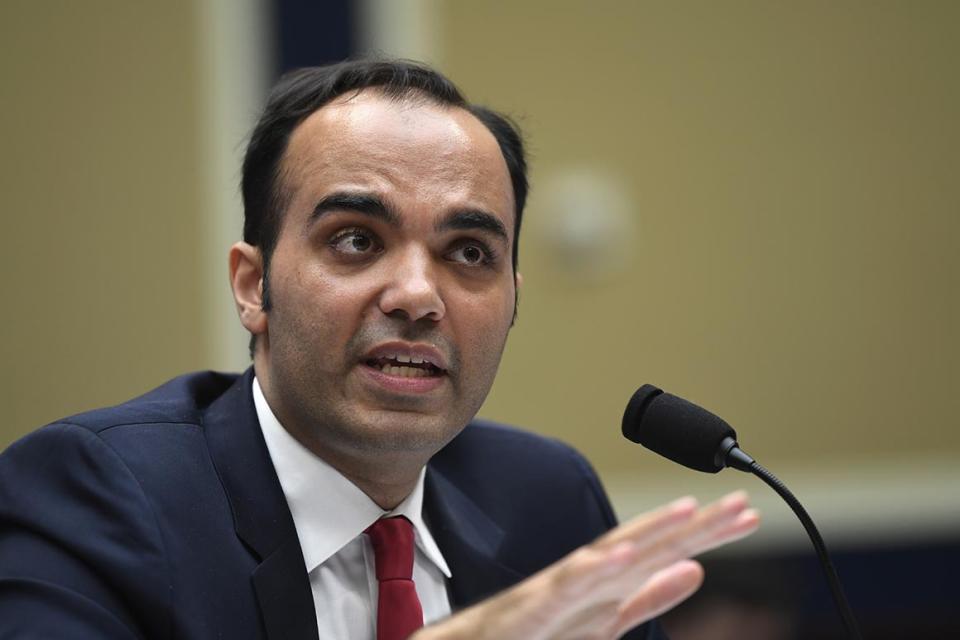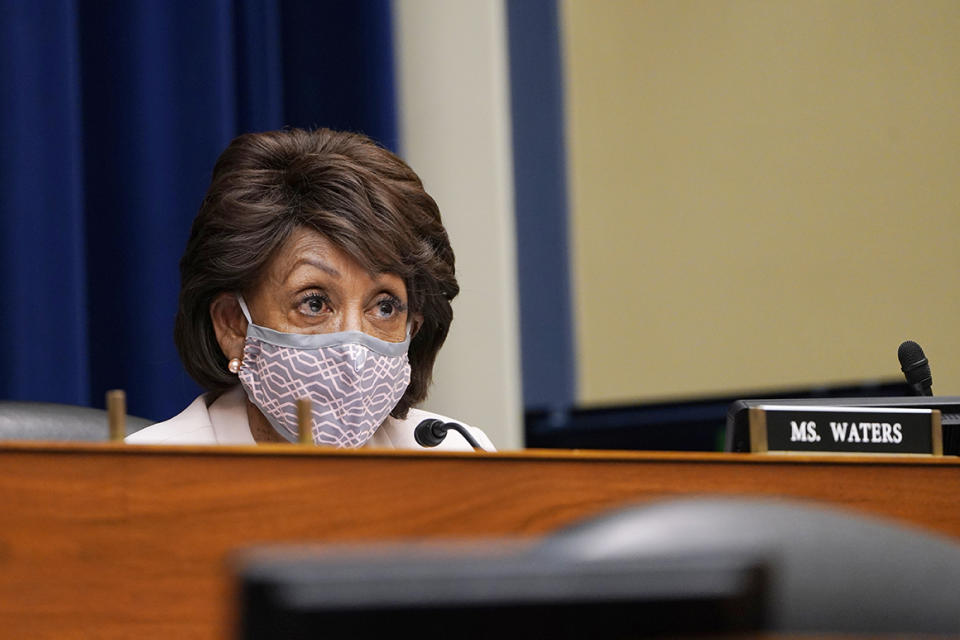Bank mergers come into Democrats’ antitrust crosshairs
The last time the Justice Department challenged a bank merger was in 1985, around the time that compact discs and New Coke debuted.
In the 36 years since, the U.S. has shed roughly 10,000 banks — some from bank failures, but most through acquisitions that regulators and antitrust prosecutors at the Justice Department have blessed. Critics say that has led to higher fees for consumers, reduced access to banking services and increased concerns about risk to the financial system.
Now, as Democrats in Congress push for an antitrust overhaul to restrain corporate power in tech, health care and agriculture, progressive lawmakers and economists also want the Biden administration to crack down on mergers in the banking sector. It’s setting up a clash with the industry, which has been lobbying for even easier merger scrutiny.
The issue is taking on greater urgency as some of the country’s biggest regional banks — PNC of Pittsburgh, Huntington Bank of Columbus, Ohio and M&T Bank of Buffalo, New York — pursue major deals.
“Bank regulators are playing with matches while wrecking the fire department,” said Senate Banking Chair Sherrod Brown (D-Ohio). “The Wall Street megabanks are so large and powerful that banks across the country feel pressured to get bigger and riskier. These mergers are a symptom of a bigger problem — deregulation has left us with Wall Street banks that are too big and that take too many risks.”
The campaign is threatening to drag big banks into a high-stakes antitrust debate even as they warn they need help from Washington to compete with financial technology upstarts. It comes as progressives play an increasingly influential role in Biden’s economic policy.
“Regulators have served as a rubber stamp for bank mergers for too long,” said Rep. Chuy García (D-Ill.), who with Sen. Elizabeth Warren (D-Mass.) has proposed legislation to overhaul how bank deals are considered. “These mergers have negative consequences for our communities. They mean more Wells Fargos and fewer local bank branches.”
The regional bank mergers at issue accelerated after moderate Democrats joined forces with Republicans in 2018 to ease lending regulations that Congress enacted after the 2008 global financial crisis.
Wall Street analysts are now predicting a merger wave, particularly after SunTrust’s easy combination with BB&T in 2019 to form Truist, the nation’s sixth-largest commercial bank.
The deal boom was delayed by the pandemic. But an increasing number of regional lenders are now planning mergers to better position themselves against the biggest banks, like JPMorgan Chase and Bank of America, whose assets in the trillions of dollars will continue to dwarf the smaller competitors even after they consolidate.
The expected M&A rush may run into antitrust headwinds as top congressional Democrats turn their sights to industries like banking where many players are already considered “too big.”
Brown, a fierce Wall Street critic whose state is also home to one of the merging banks, said Biden needs to nominate banking regulators who will work to increase competition, reduce the incentives for more mergers and limit the risks to the financial system. Brown chairs the Senate Banking Committee, which will be responsible for vetting Biden’s nominees.
García, a vice chair of the progressive caucus, wants to give the Consumer Financial Protection Bureau a say in bank reviews. Banks see the watchdog agency, the brainchild of Warren, as a major threat.
Biden’s nominee to lead the CFPB, Rohit Chopra, has criticized lax oversight on bank mergers, saying it has harmed consumers and small businesses.

“We must restore competition in the banking sector,” Chopra told the Justice Department last year.
In September, former President Donald Trump’s DOJ asked for public comments on changing its reviews of bank deals, suggesting through some of its questions it might take a more lenient approach. The rules haven’t been updated since 1995.
In response, banks made the case that the government should do more to facilitate bank mergers.
Increased regulatory burdens and the need to adopt new and better technology are pushing smaller banks to merge, said the Independent Community Bankers of America, which advocates for the smallest players.
The Bank Policy Institute, which represents the nation’s biggest lenders, argued that banks face a barrage of competition that didn’t exist in 1995. It said financial technology upstarts “compete in all aspects of consumer lending” and that they don’t rely on local branches to offer their products.
But Warren, García and 10 other House Democrats pressed DOJ to strengthen rather than weaken its reviews, as did Chopra, currently a FTC commissioner.
The Justice Department and federal banking regulators work together to vet proposed bank mergers. The banking industry and its critics both argue the agencies’ approach is out of date.
The Justice Department and the Federal Reserve, for example, rely on a statistical formula that adds up the number of banks in a given area and their deposits to determine how much competition exists.
That calculation is “a blunt instrument which doesn’t necessarily reflect the market,” said John Carusone, president of the Bank Analysis Center, a consulting group that has advised dozens of bank mergers over the past 30 years. “They are using an antique approach to a rapidly changing industry.”
The analysis is overly focused on deposits, without considering other banking products, and omits competition from online and non-bank players, he said.
The Fed, the Office of the Comptroller of the Currency and the Federal Deposit Insurance Corp. examine how a deal affects the financial stability of the banking system, whether it meets community needs and how well the banks abide by federal lending laws to offer credit to low and moderate-income families.
“These aren’t very aggressive reviews and agencies are very deferential to the mergers that come across their desk,” said Jeremy Kress, a professor at the University of Michigan who previously reviewed bank mergers at the Fed.
With Biden in office, any big changes to the DOJ’s approach are on hold as prosecutors wait for the White House to nominate the department’s antitrust chief, two individuals familiar with the matter said, speaking anonymously to discuss internal discussions.
In the meantime, the Biden administration and banking regulators will have to decide what to do about a spate of pending bank deals.
PNC announced in November that it would buy the U.S. unit of Spain’s BBVA for $11.6 billion — a merger that will give it an additional 637 branches in the South and Southwest. The newly combined bank would have about $563 billion in assets, becoming the fifth-largest commercial bank.
Rep. Maxine Waters, the California Democrat who heads the House Financial Services Committee, expressed concerns about the size of a combined PNC-BBVA. She called on the Biden administration to “take a hard look” and hold hearings as regulators did with the 2019 SunTrust-BB&T merger.

A month after the PNC announcement, Huntington said it would merge with Detroit’s TCF Financial Corp. to form a bank with $168 billion in assets, potentially making it No. 20 on the Fed’s list of biggest commercial banks.
In February, M&T announced it would merge with People’s United Bank, based in Bridgeport, Conn., for $7.6 billion. The combined bank would have about $200 billion in assets, clocking in as the U.S.’s 14th-largest commercial bank.
Last week, BancorpSouth in Tupelo, Miss. and Cadence Bank in Houston announced a $6 billion merger to increase their footprint in Texas and the southeastern U.S. The combined bank would have $44 billion in assets. BancorpSouth’s CEO told investors the companies see the merger as the first of several they may pursue over the next few years.
And on Monday, Waterbury, Conn.'s Webster Financial Corporation announced plans to merge with Pearl River, New York's Sterling Bancorp to form a "powerhouse Northeast player" with $63 billion in assets.
None of the deals would trigger federal regulation reserved for so-called global systemically important banks — a designation given to the biggest entities like JPMorgan and Wells Fargo that subjects them to stricter oversight than other lenders.
That lack of additional oversight has raised some concerns at the FDIC, the federal agency responsible for responding to bank failures. In 2019, Martin Gruenberg, a Democrat on the FDIC’s board of directors, highlighted that potential risk in the SunTrust and BB&T tie-up.
In the event of the bank’s failure, it is likely that only a much larger, systemically important bank would have the capacity to take it over, Gruenberg said. If none of the biggest banks were interested, the FDIC would be on the hook to unwind the failed bank, he said.
PNC spokesperson Marcy Zwiebel said the bank’s merger with BBVA would have little impact on U.S. financial stability. After the transaction, PNC would hold less than 3 percent of U.S. deposits.
Beyond questions about systemic risk, the deals are raising some concerns about the customer impact.
Huntington and TCF said they planned to close or consolidate 198 branches as part of the merger. The vast majority of those are in Michigan, where Huntington would shutter all 97 branches located within Meijer grocery stores.
Amanda Fischer, policy director at the Washington Center for Equitable Growth, said regulators don’t pay enough attention to how bank mergers impact consumers.
Fischer, a former aide to Brown and Waters, cited research showing that bank mergers lead to increased consumer fees and studies that branch closures result in fewer small business loans. Consumers like digital options to check bank balances or transfer money, but most people still prefer a bank branch to apply for loans or mortgages.
“There’s something to be said about being local and being able to talk to someone up the street rather than go to call center hell,” she said.
García said he is particularly concerned about how the Huntington-TCF deal might impact his West Chicago district.
“Regional banks are supposed to be focused on our communities," he said. "Mergers make it harder to keep that focus because the thrust seems to be growth and getting bigger and bigger."

